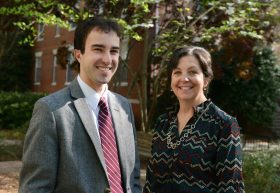Elon University senior Greg Honan researched the stories two former presidents told of public assistance recipients and found a direct influence on the way local politicians talk about social services.

[/caption]By Sarah Mulnick ‘17
Political narratives, the “stories” that politicians give to justify a partisan moves or policies, shape national impressions. Certain narratives have long-reaching impressions that can last for decades, especially with regard to social welfare.
During their campaigns and terms in office, Presidents Ronald Reagan and Bill Clinton both offered different views of the way the United States should treat public assistance. The echoes of those narratives still reverberate throughout the country, and as Elon University senior Greg Honan discovered, Alamance County in North Carolina is no exception.
For the past two years, Honan has worked with Professor Laura Roselle in the Department of Political Science and Policy Studies to explore the ways in which the welfare narratives have impacted local views and aid policies. His findings are the latest to be featured this year in a series of E-net profiles on Lumen Scholars in the Class of 2014.
“It’s an interesting political environment,” Honan said. “It made a lot of sense to use Alamance County, where enough residents are using government assistance that it seemed like people could be telling stories about it.”
The native of Wellesley, Massachusetts, examined narratives pushed by Reagan and Clinton before contrasting the ways in which those stories have impacted welfare in Alamance County.
Reagan made famous the story of a Chicago woman who abused the welfare system and his stump speech was the basis for the term “welfare queen.” Reagan’s political team pushed the narrative that welfare was being abused to the point that 30 years later its impact remains, Honan said.
Clinton, however, focused his messaging on providing aid to those who most needed it. Honan’s analysis, however, showed the Clinton team was less capable of promoting its own story as the image of a “welfare queen” persisted.
Each administration attempted to shape the way that welfare was managed on a local level. For Honan, Alamance County, with over 16 percent of the population below the poverty line, was the right place to study the local narratives. He sought to learn if narratives told by local officials were similar to those told by the federal government during Reagan and Clinton’s times in office.
“The impact of the narratives in Alamance County is difficult to quantify but massive in terms of policy,” he said. “How people make decisions about whom they vote for can be greatly influenced by the stories and narratives they hear about policy.”
Honan interviewed county commissioners and a county manager about the stories they convey of government assistance and welfare. One story nearly mirrored the same structure of the “welfare” Cadillac story Reagan made famous.
The process has been eye opening. “Stories can be more important than facts,” he said, adding that it had shocked him at first. “You can apply the lens of this research to everything.”
Roselle praised Honan not only for the quality and depth of his Lumen Prize research but for immersing himself in the intellectual life of the university and taking advantage of multiple learning opportunities.
“He found at Elon and took full advantage of the courses and faculty and experiences that would challenge him,” Roselle said.
The Lumen Prize, awarded for the first time in 2008, provides selected students with a $15,000 scholarship to support and celebrate their academic and creative achievements. Lumen Scholars work closely with faculty mentors to pursue and complete their projects.
Efforts include course work, study abroad, research both on campus and abroad during the regular academic year and summers, internships locally and abroad, program development and creative productions and performances.
“The Lumen prize has been vital for resources,” Honan said. “It helped to advance my intellectual journey and support me when I studied at the University of St. Andrews’ International Relations program.”
In addition to his efforts with the Lumen, Honan has been involved on campus in a variety of roles, including his position as executive intern for the Office of the President and the founder of the Politics Forum, an effort to bring students, faculty and community members together for non-partisan political discussions on important issues of the day.
The political science major started a push to improve the intellectual climate at Elon, winning the Isabella Canon Scholarship for “academic achievement and contributions to political science program.”
“Without him, we really wouldn’t be having the conversations we’re having right now on this campus about intellectual climate,” Roselle said. “He’s really, deeply committed to it.”
Honan has applied for research assistant positions at the Harvard Kennedy School and Harvard University after his Elon University graduation. The Kennedy School would be a familiar place to Honan; he interned there each of the past two summers for former presidential adviser David Gergen.
He is also in the process of identifying ways to edit and submit his research to academic journals.


